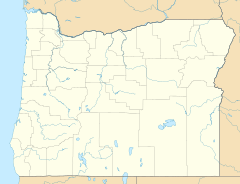Prosper, Oregon facts for kids
Quick facts for kids
Prosper, Oregon
|
|
|---|---|
| Country | United States |
| State | Oregon |
| County | Coos |
| Elevation | 13 ft (4 m) |
| Time zone | UTC-8 (Pacific (PST)) |
| • Summer (DST) | UTC-7 (PDT) |
| GNIS feature ID | 1136660 |
Prosper is a historic place in Coos County, Oregon, United States. It is known as an unincorporated community. This means it is a place that does not have its own local government.
Prosper is located about 3 miles (5 km) northwest of Bandon. It sits right next to the Coquille River. Today, there is no longer a town at this spot.
Contents
Discovering Prosper's Past
Prosper began as a busy place along the Coquille River. Its name was likely chosen because people hoped it would become a very successful and "prosperous" community.
Early Industries and Founding
The first cannery on the Coquille River started around 1882. It was built by D. H. Getchell in the area that later became Prosper. A cannery is a factory where food, like fish, is preserved in cans.
Prosper was officially founded in the summer of 1892. A man named Adam Pershbaker started the community. He built a sawmill and a shipyard there. A sawmill cuts logs into lumber. A shipyard is where boats are built or repaired.
Soon after, the Emil Heuckendorff shipyard also opened. This shows how important boat building was to the area.
Life in Prosper: Post Office and Population
Prosper had its own post office from 1893 until 1928. Adam Pershbaker, who founded the town, was also its first postmaster. The post office helped people send and receive mail.
By 1915, Prosper was a thriving community. Its population grew to about 500 people. The town had two salmon canneries, which processed fish from the river. It also had two shingle and sawmills. Shingles are thin pieces of wood used for roofs.
Getting Around: River Transportation
Travel was easy by boat on the Coquille River. Passenger boats went three times a day from Prosper. They traveled to nearby towns like Bandon and Coquille. This made it simple for people to move goods and visit other places.
 | Selma Burke |
 | Pauline Powell Burns |
 | Frederick J. Brown |
 | Robert Blackburn |



